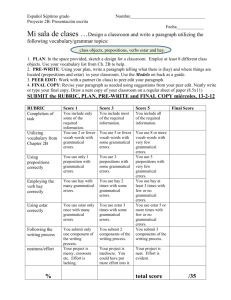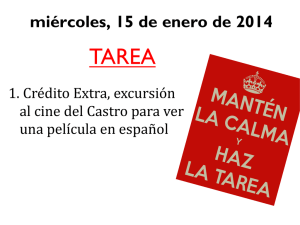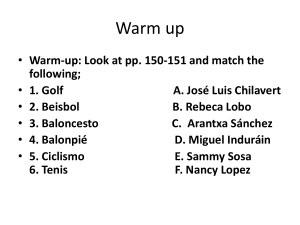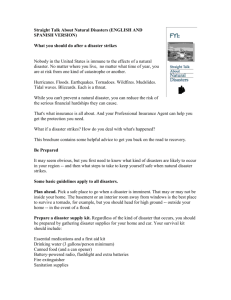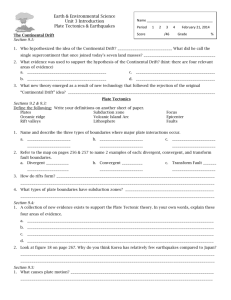Ob-Gyn Medical Spanish - Ob/Gyn Residents` Resources
advertisement
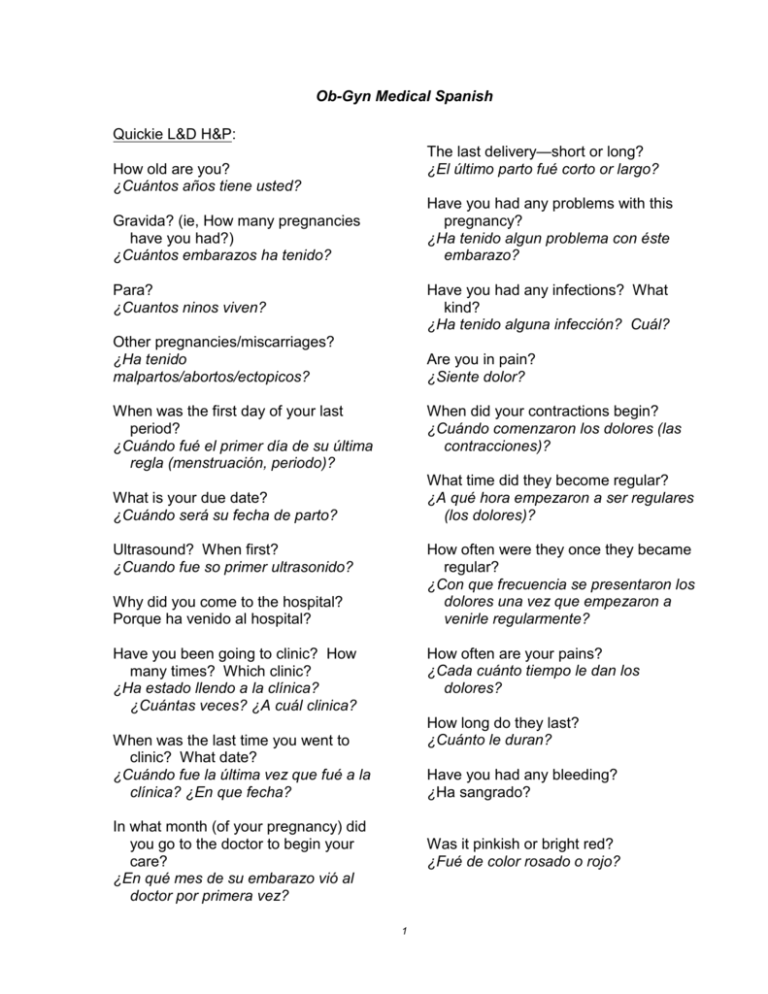
Ob-Gyn Medical Spanish Quickie L&D H&P: The last delivery—short or long? ¿El último parto fué corto or largo? How old are you? ¿Cuántos años tiene usted? Have you had any problems with this pregnancy? ¿Ha tenido algun problema con éste embarazo? Gravida? (ie, How many pregnancies have you had?) ¿Cuántos embarazos ha tenido? Para? ¿Cuantos ninos viven? Have you had any infections? What kind? ¿Ha tenido alguna infección? Cuál? Other pregnancies/miscarriages? ¿Ha tenido malpartos/abortos/ectopicos? Are you in pain? ¿Siente dolor? When was the first day of your last period? ¿Cuándo fué el primer día de su última regla (menstruación, periodo)? When did your contractions begin? ¿Cuándo comenzaron los dolores (las contracciones)? What time did they become regular? ¿A qué hora empezaron a ser regulares (los dolores)? What is your due date? ¿Cuándo será su fecha de parto? Ultrasound? When first? ¿Cuando fue so primer ultrasonido? How often were they once they became regular? ¿Con que frecuencia se presentaron los dolores una vez que empezaron a venirle regularmente? Why did you come to the hospital? Porque ha venido al hospital? Have you been going to clinic? How many times? Which clinic? ¿Ha estado llendo a la clínica? ¿Cuántas veces? ¿A cuál clinica? How often are your pains? ¿Cada cuánto tiempo le dan los dolores? How long do they last? ¿Cuánto le duran? When was the last time you went to clinic? What date? ¿Cuándo fue la última vez que fué a la clínica? ¿En que fecha? Have you had any bleeding? ¿Ha sangrado? In what month (of your pregnancy) did you go to the doctor to begin your care? ¿En qué mes de su embarazo vió al doctor por primera vez? Was it pinkish or bright red? ¿Fué de color rosado o rojo? 1 How much? A cupful? A tablespoonful? A teaspoonful? ¿Cuánta sangre? ¿Una taza? ¿Una cucharada? ¿Una cucharadita? Are they all living? ¿Están todos vivos? What was the cause of death? At what age? ¿Cuál fue la causa de muerte? ¿A qué edad? Are you passing clots? Very large? ¿Le salen coágulos? ¿Muy grandes? Did your membranes rupture? Has your bag of waters broken? ¿Se le reventó la bolsa de agua? ¿Se le reventó la fuente? Were any born early (premature)? ¿Ha tenido usted algun niño prematuro? What year were they born? ¿En que año nacieron? What time did it break? ¿A qué hora se le reventó? Was s/he born vaginal or by cesarean? ¿El naciemiento fué normal (por la vagina) o por cesárea? How much water did you lose? Down the legs? ¿Cuánta agua perdió? ¿Le mojó las piernas? How much did they weigh @ birth? ¿Cuánto pesó el bebé al nacer? Your cervix is dilated to 3 centimeters. Su cuello tiene tres centímetros de dilatación. Have you ever had a miscarriage? ¿Ha tenido usted algún malparto un aborto o perdió algún embarazo? Your cervix is not dilated. ¿Su cuello no está dilatado (abierto). Have you ever had an abortion? ¿Ha tenido un aborto provocado? You are in labor. Your membranes have ruptured. ¿Está en trabajo de parto. Su fuente está rota. Have you ever had an ectopic (tubal) pregnancy? ¿Ha tenido un embarazo ectópico (embarazo en la trompa)? Obstetric History Have you ever had a stillborn? ¿Ha tenido un niño qué nació muerto? Have you had any problems with past pregnancies? ¿Ha tenido problemas con sus embarazos pasados? Have you ever had a cesarean section? ¿Ha tenido usted una operación cesárea? Bleeding? Hypertension? Toxemia? ¿Tuvo sangrado? ¿Tuvo alta presión de sangre? ¿Tuvo toxemia? Why? What date? ¿Porqué? ¿En qué fecha? HTN? Bleeding? Too large baby? ¿Alta presión? ¿Sangrado? ¿Bebé demasiado grande? How many children have you had? ¿Cuántos niños ha tenido? 2 Narrow pelvis? Fatigue? Breech? ¿Pelvis estrecha? ¿Fatiga? ¿Bebé sentado? Have you had any operations? ¿Ha tenido alguna operación (cirugía)? Your cervix wouldn’t open? ¿El cuello de la matriz no se abrió? Past Gynecologic History What do you use for birth control? ¿Qué typo de anticonceptivo usa? What was the date of your last pregnancy? ¿En qué fecha fué su último embarazo? Have you ever had a sexually transmitted infection? ¿Ha tenido alguna venérea enfermedad? What was the weight of your largest (smallest) baby? ¿Cuánto peso su bebé más grande (pequeño) al nacer? Have you ever had an abnormal pap smear? ¿Ha tenido un papanicolao anormal (malo)? After birth, any problems with the children? …like birth defects? Mental retardation? ¿Algun niño tuvo defectos de nacimiento? ¿Retraso mental? When was your last pap? ¿Cuando fué su último papanicolao? What was the cause of death? At what age? ¿De qué murió su niño? A qué edad? Are your periods regular? Are they light, medium, or heavy? ¿Le viene la regla normal cada mes? ¿Leve, normal, o abundante? Past Medical History, Past Surgical History Do you get cramps with your period? ¿Le da cólico con su regla? Do you have any medical problems? ¿Tiene usted algún problema médico? On a scale of 1 to 10, 1 being very mild pain and 10 being very strong pain, how bad is your pain? ¿Del uno al diez, el uno siendo muy leve, y el diez muy fuerte, que número le daría a su dolor? Hypertension? ¿Alta presión? Heart disease? ¿Enfermedad del corazón? Asthma/Tuberculosis? ¿Asma/tuberculosis? When was your last mammogram? ¿Cuándo fue su última mamografía? Problems with your kidneys, urine infections, liver, hepatitis, diabetes, thyroid disease, seizures, or cancer (colon, breast)? Social History, Meds, Allergies, Family History Do you smoke, drink or do any drugs? ¿Fuma cigarrillos? ¿Bebe alcool? ¿Usa drogas? ¿Problemas con riñones, infección de orina, hígado, hepatitis, diabetes, enfermedad de la tiroides, convulsiones (ataques) o cáncer (de los intestinos, senos/pechos)? With whom do you live? ¿Con quién vive? 3 Is there violence in your home? ¿Hay violencia en su casa? Have you had swelling of both hands, face, legs? ¿Se le han hinchado las manos, la cara, las piernas? Do you take any medicines? ¿Está tomando medicinas? Can you use/wear your rings? ¿Puede ponerse sus anillos? Do you have any allergies? ¿Tiene usted alguna alergia? Go to L&D if: you have vaginal bleeding; your water breaks; (if preterm)you have >6 contractions per hour; you are have regular contractions every 5” (if full-term); or if the baby isn’t moving for >8h even though you ate something. Has anyone in your family had…? ¿Alguien en su familia ha tenido…? See above for conditions. Return OB Visit Have you had any problems with this pregnancy? ¿Ha tenido algún problema con éste embarazo? Vaya al hospital se tiene sangrado vaginal, si se rompe su fuente, si tiene más de seis contracciones en una hora, si tiene contracciones regulares cada cinco minutos, si el bebé no se mueve por más de ocho horas, aunque ha ya comido. Have you been vomiting? ¿Ha estado vomitando? Have you had any infections? Of what? ¿Ha tenido alguna infección? De qué? Instructions Have you felt the baby move yet? ¿Ha sentido que su niño se mueve? You are going to stay in the hospital. Se va a quedar en el hospital. Has the baby been moving normally? ¿Se ha movido bastante su niño? You may go home. Se puede ir a casa. Have you had painful urination? ¿Ha tenido dolor al orinar? You are in early labor. Está en la primera parte del parto. Have you had the urge to urinate often? ¿Tiene ganas de orinar muy a menudo? Stay at the hospital and walk for two hours. Quédese aquí en el hospital y camine por dos horas. Have you spots/starts in front of your eyes? ¿Ha notado manchas enfrente de los ojos? The heartrate of the baby is normal. El corazón del niño está normal. Have you had severe headaches? ¿Ha tenido dolores de cabeza fuertes? Take off your clothes. Quítese la ropa. How many times a week? ¿Cuántas veces en una semana? Take off your panties. Quítese su ropa interior (panteletas). 4 (ruptured) Head Breasts Nipple Butt Rectum Bladder Vagina Cervix (reventada/roto) la cabeza los senos el pezón las sentaderas el recto la vejiga la vagina el cervix, el cuello de la matriz Uterus el útero, la matriz Fallopian tubes las trompas (los tubos) Ovaries los ovarios Cyst el quiste I am going to examine you. Voy a examinarla. Bend your knees. Doble las rodillas. Open your legs. Abra las piernas. Put your feet together. Junte los pies. Relax your body. Descanse (relaje) el cuerpo. Lie down on your back. Acuéstese en su espalda. (Acuéstese boca arriba). Other Mild Medium Heavy Severe Lie down on your right (left) side. Acuéstese de lado derecho (izquierdo). Move down on the table. Bájese. Postpartum/Post-Operative: How do you feel? ¿Como se siente? Move. Muévase. Have you passed gas? ¿Ha pasado gas por detras? Don’t push. No empuje. Have you had a bowel movement? ¿Ha pasado excremento? Breath through your mouth. Respire por la boca. Are you dizzy when you stand up? ¿Tiene mareas cuando levanta? Push with your pains. Empuje cuando sienta dolor. Do you feel pain? Nausea? Vomiting? ¿Siente dolor? Tiene nausea? Vomito? Do you understand? ¿Comprende? Congratulations. You have a baby girl (boy). Felicitaciones. Es una niña (un niño). Are you having vaginal bleeding? Is it heavy? It’s normal to have a bloody vaginal discharge for up to 6 weeks postpartum. ¿Tiene sangre por la vagina? ¿Sangra demasiado? Es normal a tener flujo con sangre por la vagina hasta seis semanas despues el nacimiento. Anatomy Abdomen Appendix Leve Mediando Abundante Severo/Fuerte el abdomen/vientre, la barriga el apéndice 5 You had the kind of c-section that you can try to have your next baby vaginally. Ha tenido el typo de cesarea despues que puede tener su proximo bebe por la vagina. If you use condoms, you must have lubrication by the bedside because it is very common after having a baby to have more vaginal dryness. If you have sex without enough lubrication, you may get vaginal irritation. Si usa condones, necesita tener lubrication al lado de la cama porque es muy commun despues un nacimiento a estar seco en la vagina. Si tiene relaciones sin bastanta lubrication, puede tener irritacion en la vagina. You had the kind of c-section that you should not try to have vaginal birth again. You need to have c-sections for all your future deliveries. Ha tenido el typo de cesarea despues que is importante que no trata a tener bebes por la vagina. Necesita tener cesareas por todo sus embarazos en el futuro. If you use Birth Control Pills or Patch, you should wait until the 3rd Sunday after you had the baby to start them. Si usa las pastillas anticonceptivas o el parche, necesita esperar hasta el tercer domingo despues el nacimiento para empezarlos. When the baby delivered, your anal sphincter tore. You must be careful not to strain too much or have constipation so that you don’t tear out your stitches. Cuando el bebe salio, a rompado su ano. Necesita cuidarse para no hacer demasiado fuerza o a tener estrenimiento para no romper las puntadas en su ano. If you have the 3-month shot, you can get it before you leave the hospital. Si quiere la inyeccion, puede receberlo antes de salir el hospital. If you have the IUD, you should not have sex until your doctor can put it in, after your 6 week checkup. Si quiere el dispositivo, es important que no tenga relaciones antes de su cita a seis semanas cuando su doctor puede ponerlo. Your stitches will dissolve. Sus puntadas van dessolver naturalmente. What do you want to use for birth control? ¿Que quiere usar para anticonceptivo? You can get the 3-month shot once, to cover you until you can get your IUD. Puede receber la inyeccion de tres meses una vez para cubrir usted hasta puede receber el dispositivo. Condoms? Birth Control Pills? Threemonth shot? IUD? Patch? Condones? Pastillas anticonceptivas? La inyecion de tres meses? El dispositivo? El parche? With the patch, 1 patch is for 1 week. Each Sunday, you put on a new patch. You wear it 3 weeks on, 1 week off. You should have your period the week you have it off. You must remember to start it the next Sunday after your patch-free week. We recommend that you not have sex until after your 6 week checkup. Recommendamos a no tener relaciones por las seis semanas hasta su cita en la clinica. 6 Con el parche, un parche es por una semana. Cada domingo, ponga un parche nuevo. Tiene tres semanas con parche, una semana sin parche. Va tener la regla durante la cuarto semana cuando no usa el parche. Necesita recordar a empezar el parche otra vez despues la semana sin parche. Breastfeeding is very good for the baby. Breastfeeding is easier and cheaper than bottle-feeding. Breastfed babies have less infections than formula-fed babies. A comer por el pecho es muy bien por el bebe. Comer por el pecho es mas facil y mas barato que toma botella. Bebes quien come por el pecho tienen menos infecciones que bebes quien toma bottella. If you are breastfeeding and want oral contraceptives, we usually give the progestin-only pill to not decrease your breastmilk. This pill is “weaker” than the regular pill and you cannot be late in taking it. You must take it the same time everyday or you may get pregnant. If you miss it, you should use condoms. Si el bebe come por el pecho y quiere pastillas anticonceptivas, damos la pastilla con solamente progestin (no estrogen) para no disminuer la leche. Este pastilla es mas leve que la pastilla regular, y no puede tomarlo tarde. Necesita tomarlo al mismo tiempo cada dia o puede embarasarse. Si olvida su pastilla, necesita usar condones por un mes en addicion a las pastillas. You have anemia. You must take iron to build your blood supply up. You will feel stronger (less weak) if you do. Tiene anemia. Necesita tomar iero para hacer su sangre mas fuerte. Va sentir mas fuerte (menos debil) si toma su iero. I’m writing a prescription for stool softener. It’s also important to drink a lot of water and eat fruits & vegetables so you have soft poop (no constipation) that’s easy to pass. Escribo una recetta por medicine para hacer su excremento mas blandito. Es importante a tomar much agua y a comer muchas frutas y verduras para tener excremento blandito (no estrenimiento) que es facil a pasar. The regular birth control pill and the patch may diminish your breastmilk production. The 3-month shot and the IUD should not affect your breastmilk production. You may want to start with the 3-month shot, and switch over at your 6 week checkup when you know your milk supply is well-established. La pastilla anticonceptiva regular y el parche pueden disminuer la leche. La inyeccion de tres meses y el dispositivo no affectan la leche. Puede empazar con la inyeccion, y a su cita de seis semanas, puede cambiar a otro metodo cuando esta segura que su leche viene bien. 7 8
